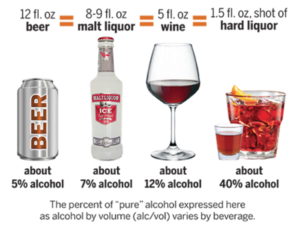Get Edu-CAT-ed
According to the Distilled Spirits Council, 88% of adults in the U.S. do not know that a standard drink of beer or wine contains the same amount of alcohol as a 1.5 oz. serving of spirits.
1. Know The Limits
It’s important to understand the serving sizes of alcoholic drinks and how different amounts can affect your body.
2. Moderation is Key
Use alcohol in moderation. Set a limit for yourself and stick to it. Decide in advance how much you’ll drink on any occasion.
3. Don’t Over Do It
Avoid situations where you might be tempted to binge drink or overindulge, as this increases risk and impaired judgment.
4. Eat Before Drinking
Consuming food before or while drinking can slow the absorption of alcohol into your bloodstream.
5. Stay Hydrated
Alternate alcoholic beverages with water to stay hydrated and to reduce the effects of alcohol.
6. Designated Driver
If you’re drinking with friends, designate a sober driver or arrange alternative transportation.
7. Know When to Stop
Pay attention to your body and stop drinking when you begin to feel different. Listen to your limits. This is a key factor to staying safe and avoiding risks of intoxication.
8. Avoid Medication Interactions
Check with your doctor or pharmacist about potential interactions between alcohol and any medications you’re taking.
9. Be Responsible for Others
Look out for your friends. Try to help them limit high risk choices and don’t let them drive if they’ve had too much to drink.
10. Respect Others
Be mindful of how your drinking behavior may affect those around you.
11. Take Breaks
Consider taking regular breaks from drinking to give your body time to recover.
12. Know the Legal Limits
Familiarize yourself with the legal limit in your area.
13. Download an App
Utilizing a Blood Alcohol Calculator (BAC) can assist you in estimating how your body could respond to alcohol over a period of time while taking into account individual factors.






